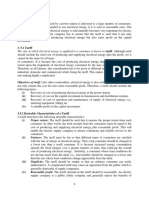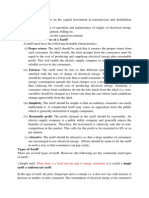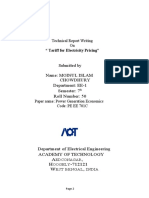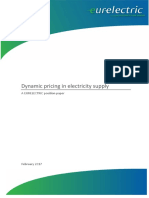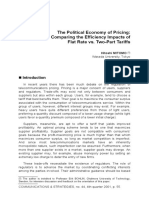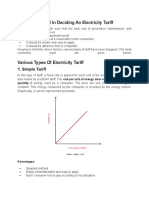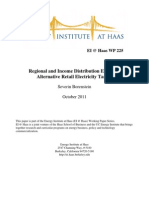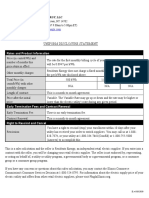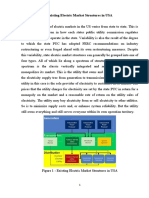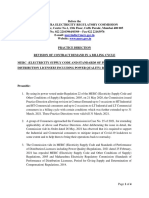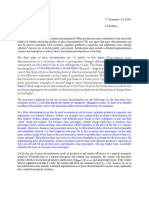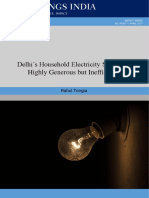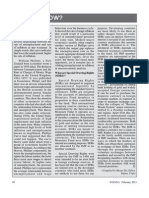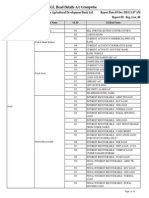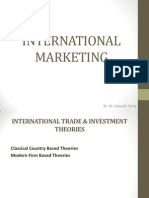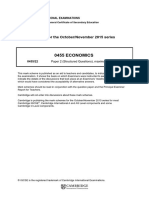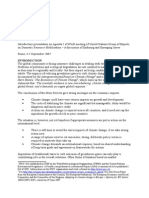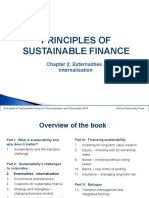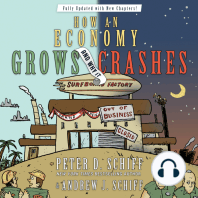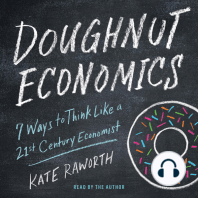Professional Documents
Culture Documents
Bulk Supply Tariff
Uploaded by
shroffhardikOriginal Description:
Copyright
Available Formats
Share this document
Did you find this document useful?
Is this content inappropriate?
Report this DocumentCopyright:
Available Formats
Bulk Supply Tariff
Uploaded by
shroffhardikCopyright:
Available Formats
Differential Bulk Supply Tariff
Differential Bulk Supply tariff (DBST) refers to a model of electricity supply known as Single Buyer Model where in there exists one buyer or company which buys electricity from different generators as per the power purchase agreement. The buyer then allocates the electricity among different distribution utilities. The bulk supplier can charge Uniform Bulk Supply Tariffs or Differential Bulk Tariff (DBST) from the utilities but the reason for its existence is mainly because the bulk supplier differentiates between the buyers or distribution utilities and levies differential bulk supply tariff on them. The differentiation is mainly on account of varied sales and consumer mix, i.e., the buyer/ distribution utility with less revenue generating consumer mix would be charged the lower bulk supply tariff as compared to the DBST charged to the buyer having favorable consumer mix. The Commission agreed with the prayer of the DISCOMs for adoption ofDifferential Bulk Supply (BST) Mechanism for a uniform structure ofretail supply tariffs in the four DISCOMs. BST ensures that consumers insimilar categories in the State of Gujarat have similar tariff and there maynot be any discrimination among the consumers. While deciding BST rates for various DISCOMs the Commission took care that the BulkSupply Tariff reflects efficiency of the DISCOMs Historically, the Revenues and cost of supply are different in each of the DISCOMs areas. The revenue is depending upon the consumer profile of the DISCOM apart from variance in consumption pattern, quality of supply etc. The Cost of supply is different because of differences in network pattern, asset profile, employees strength, O & M practices, varying loss levels etc., apart from differences in the power purchase rate which has now arisen.
Power purchase agreements have been assigned to distribution companies. In that State, a differential retail tariff is being considered across various distribution companies on account of factors such as the percentage of agricultural and rural consumers requiring subsidies, transmission losses, age of power stations and type of fuel used. On the flip side, some electricity supply companies might have to steeply raise their tariffs and that is likely to invite protests from consumers. There may also be a sense of discrimination among power consumers in different regions within the State. If the tariff is to be reduced, the Government will have to provide more subsidies.
If the differential bulk supply tariff is not charged, then in the event of profit being earned by any of the DISCOMs in future, it would not be possible to withdraw/ transfer such profits to loss making companies and therefore, differential higher bulk supply tariff could be charged to such companies.
Merits DBST takes care, via power purchase allocation, of different load profiles of the distribution companies so that retail tariffs are uniform in the state for different categories of consumers. National tariff policy section 8.4 specifies the same. DBST enables implementation of Uniform Retail Tariff without any subsidy or government intervention in the sector. Demerits DBST impacts allocative efficiency, i.e., it distorts investment decisions. If the licensee realizes that its efficiency would not be rewarded and indeed it would be penalized by way of costly power purchase rate, the licensee would not have any incentive to undertake efficiency enhancing investment. Creating and maintaining differential power purchase costs for licensees would not create a level playing field between the different licensees, which may be essential in an environment where there is consumer choice and therefore competition. Level playing field is essential when the licensees may have to compete in the open access market with each other.
You might also like
- CAREC Energy Strategy 2030: Common Borders. Common Solutions. Common Energy Future.From EverandCAREC Energy Strategy 2030: Common Borders. Common Solutions. Common Energy Future.No ratings yet
- Demystifying Power Tariffs - Opinion 2018Document4 pagesDemystifying Power Tariffs - Opinion 2018Ravi DhakarNo ratings yet
- Electricity Tariffs Abu Dhabi GuideDocument5 pagesElectricity Tariffs Abu Dhabi GuideranasherdilNo ratings yet
- Electricity Marginal Cost Pricing: Applications in Eliciting Demand ResponsesFrom EverandElectricity Marginal Cost Pricing: Applications in Eliciting Demand ResponsesNo ratings yet
- Unbundling and Deregulating Electric Power in Tamil Nadu, IndiaDocument15 pagesUnbundling and Deregulating Electric Power in Tamil Nadu, IndiaChandrakant RathoreNo ratings yet
- America: Powered by CompetitionDocument12 pagesAmerica: Powered by Competitioncingoski123No ratings yet
- Open Access in PowerDocument19 pagesOpen Access in PowerAshok VermaNo ratings yet
- ERIM DHF Ek KSNRB MDocument11 pagesERIM DHF Ek KSNRB MThe BackdropNo ratings yet
- TariffDocument4 pagesTariffpanNo ratings yet
- Flat RatesDocument5 pagesFlat RatesaliNo ratings yet
- 2 3PublicUtilPricingDocument3 pages2 3PublicUtilPricingmarktf8No ratings yet
- Electricity Market ReviewDocument11 pagesElectricity Market ReviewHakob ManukianNo ratings yet
- 7th Week TariffDocument15 pages7th Week TariffPankaj RajNo ratings yet
- Power Distribution Franchising Concept PaperDocument4 pagesPower Distribution Franchising Concept Papergautamkapoor2006No ratings yet
- Desirable Characteristics and Types of Electricity TariffsDocument4 pagesDesirable Characteristics and Types of Electricity TariffsNishit KumarNo ratings yet
- Tariff Technical ReportDocument9 pagesTariff Technical ReportREXGODNo ratings yet
- Senate Bill No. 7 - Texas Electric Restructuring Act 1999Document5 pagesSenate Bill No. 7 - Texas Electric Restructuring Act 1999al mooreNo ratings yet
- Dynamic Pricing in Electricity Supply: A EURELECTRIC Position PaperDocument16 pagesDynamic Pricing in Electricity Supply: A EURELECTRIC Position PaperAlen FadigaNo ratings yet
- Principles of Tariff Design PDFDocument46 pagesPrinciples of Tariff Design PDFDrVikas Singh BhadoriaNo ratings yet
- 10 1 1 325 2975 PDFDocument16 pages10 1 1 325 2975 PDFali fatehiNo ratings yet
- Impacts of Solar Power On Electricity Rates and BillsDocument13 pagesImpacts of Solar Power On Electricity Rates and BillsAftab HussainNo ratings yet
- Power Tariff Types and Load Distribution ParametersDocument24 pagesPower Tariff Types and Load Distribution ParametersNaavaneethNo ratings yet
- Nonlinear PricingDocument240 pagesNonlinear PricingsampahmelNo ratings yet
- Electricity Tariff: Definition: The Amount of Money Frame by TheDocument15 pagesElectricity Tariff: Definition: The Amount of Money Frame by TheDhruvaNo ratings yet
- TariffsDocument49 pagesTariffsvenki249No ratings yet
- Open AccessDocument2 pagesOpen AccessAngel SrivastavaNo ratings yet
- Ppe Unit 5 TarifsDocument6 pagesPpe Unit 5 TarifsCharyNo ratings yet
- Unit 4-Philosophy of Market ModelsDocument31 pagesUnit 4-Philosophy of Market Modelspriyans100% (1)
- Chapter Seven Electricity Pricing and ManagementDocument20 pagesChapter Seven Electricity Pricing and ManagementBassem MostafaNo ratings yet
- Regional and Income Distribution Effects of Alternative Retail Electricity TariffsDocument26 pagesRegional and Income Distribution Effects of Alternative Retail Electricity TariffsMathieu GrandjeanNo ratings yet
- Are Consumers Attentive To Local Energy Costs? Evidence From The Appliance MarketDocument2 pagesAre Consumers Attentive To Local Energy Costs? Evidence From The Appliance MarketCato InstituteNo ratings yet
- Real-Time Dynamic Pricing, A More Recent Option in Only A Few Markets To Date, Prices Can Vary by A FactorDocument11 pagesReal-Time Dynamic Pricing, A More Recent Option in Only A Few Markets To Date, Prices Can Vary by A FactorAshik AhmedNo ratings yet
- The Tariffs of Tomorrow: by Ahmad Faruqui and Cecile BourbonnaisDocument8 pagesThe Tariffs of Tomorrow: by Ahmad Faruqui and Cecile BourbonnaisRicardo Ernesto Antonio Vargas ZapataNo ratings yet
- Electric TermsDocument6 pagesElectric TermsAl VersallesNo ratings yet
- Internmetnor PaperDocument7 pagesInternmetnor Paperapi-308674507No ratings yet
- Energy AssignmentDocument4 pagesEnergy Assignmentakshay royalNo ratings yet
- Existing Electric Market Structures in USADocument4 pagesExisting Electric Market Structures in USAПолина КононенкоNo ratings yet
- Guidance: The Electricity Trading ArrangementsDocument22 pagesGuidance: The Electricity Trading ArrangementsYoNo ratings yet
- Overview of PPA FinancingDocument9 pagesOverview of PPA FinancingMohit AgarwalNo ratings yet
- Syed Babar Ali School of Science and EngineeringDocument41 pagesSyed Babar Ali School of Science and EngineeringZeeshan KhanNo ratings yet
- Electric Tariff Rates ExplainedDocument3 pagesElectric Tariff Rates Explainedsushant7136No ratings yet
- Practice Direction-26.05.2021Document4 pagesPractice Direction-26.05.2021Faizan Bin Abdul HakeemNo ratings yet
- The Future of Electricity Rate Design - McKinseyDocument10 pagesThe Future of Electricity Rate Design - McKinseyNuno MonteiroNo ratings yet
- Catalogo Caccia Nr.14 2019Document10 pagesCatalogo Caccia Nr.14 2019Nuno MonteiroNo ratings yet
- 07EEE - 2023 - Tariff StructureDocument31 pages07EEE - 2023 - Tariff StructureAmbadiNo ratings yet
- Module 2 - Week 2Document9 pagesModule 2 - Week 2Temp LordNo ratings yet
- Energy DeregulationDocument2 pagesEnergy DeregulationMike SakkestadNo ratings yet
- Powering One IndiaDocument27 pagesPowering One IndiaDsingh SinghNo ratings yet
- Comparing Flat Rate and Two-Part Tariffs for Telecom PricingDocument16 pagesComparing Flat Rate and Two-Part Tariffs for Telecom PricingalifatehitqmNo ratings yet
- May 2016 Electricity MarketDocument20 pagesMay 2016 Electricity MarketGr3Y zØN3 (呆呆的恶魔)No ratings yet
- ECO603m: Price discrimination and efficiencyDocument4 pagesECO603m: Price discrimination and efficiencyNeale CacNo ratings yet
- Revenue Loss From Open Access Epw 055A01Document15 pagesRevenue Loss From Open Access Epw 055A01Anonymous R7eyaT6qKNo ratings yet
- Electricity RegulationsDocument26 pagesElectricity RegulationsAnderson Arenas MolinaNo ratings yet
- Types of Tariff in The Power System-1Document5 pagesTypes of Tariff in The Power System-1Godspower ImonigbaborNo ratings yet
- Price Discrimination of Electricity - Group3 - AutomobileDocument6 pagesPrice Discrimination of Electricity - Group3 - AutomobilePRATIK MUKHERJEENo ratings yet
- Ihbal UjeeeDocument11 pagesIhbal UjeeeLibyan KnightNo ratings yet
- Impact Series Paper - Delhi Power Subsidies - TongiaDocument37 pagesImpact Series Paper - Delhi Power Subsidies - Tongiagroup 6No ratings yet
- DeregulationDocument10 pagesDeregulationSandeep VarmaNo ratings yet
- Residential Consumer Guide To Community Solar - FINALDocument6 pagesResidential Consumer Guide To Community Solar - FINALbenjamin.munoz.vNo ratings yet
- Women's Squash Player Wins National ChampionshipDocument7 pagesWomen's Squash Player Wins National ChampionshipshroffhardikNo ratings yet
- Do You Know Philips Curve and SDR Yojana February 2013Document1 pageDo You Know Philips Curve and SDR Yojana February 2013shroffhardikNo ratings yet
- SCience & Tech UPSC 2011Document17 pagesSCience & Tech UPSC 2011shroffhardikNo ratings yet
- Renewable Energy Certificates ExplainedDocument4 pagesRenewable Energy Certificates ExplainedshroffhardikNo ratings yet
- CF Group 5 - Carbon InfrastructureDocument29 pagesCF Group 5 - Carbon InfrastructureshroffhardikNo ratings yet
- 2010 - Nov - Shale Gas - Expanding Indias Gas FrontierDocument5 pages2010 - Nov - Shale Gas - Expanding Indias Gas FrontiershroffhardikNo ratings yet
- Cost Analysis and Financial Projections for Gerbera Cultivation ProjectDocument26 pagesCost Analysis and Financial Projections for Gerbera Cultivation ProjectshroffhardikNo ratings yet
- Old Salary vs New Salary ComparisonDocument8 pagesOld Salary vs New Salary ComparisonshroffhardikNo ratings yet
- Lecture3 EC2B1 MollDocument57 pagesLecture3 EC2B1 MolllframosunahNo ratings yet
- Ellora Times Case StudyDocument9 pagesEllora Times Case Studyashpika100% (1)
- GL Head According To Acc GroupDocument16 pagesGL Head According To Acc GroupVIKAS GARGNo ratings yet
- DCR Report 2022Document24 pagesDCR Report 2022Harris AliyarNo ratings yet
- CIR V SONY Case DigestDocument2 pagesCIR V SONY Case DigestAndrea TiuNo ratings yet
- Effects of Fuel Subsidy On Transport Costs and Transport Rates in NigeriaDocument10 pagesEffects of Fuel Subsidy On Transport Costs and Transport Rates in NigeriaMicheal BenatNo ratings yet
- Dublin Bus and Bus Eireann ReviewDocument119 pagesDublin Bus and Bus Eireann ReviewJohn SirautNo ratings yet
- Assignment Topic: Critically Evaluate The Economic Factors and PoliticalDocument6 pagesAssignment Topic: Critically Evaluate The Economic Factors and PoliticalChelsi KukretyNo ratings yet
- Coremacroeconomics 3rd Edition Chiang Solutions ManualDocument25 pagesCoremacroeconomics 3rd Edition Chiang Solutions ManualEugeneMurraywnmb100% (55)
- Opt For A Change of Your Electric Connection From Single To Multi Point in Your Multi-Story Society in UP - Bijli Bachao - Bijli BachaoDocument12 pagesOpt For A Change of Your Electric Connection From Single To Multi Point in Your Multi-Story Society in UP - Bijli Bachao - Bijli BachaoLegal ClawsNo ratings yet
- 6154ab8d72e7d Sankalp StrategiaDocument5 pages6154ab8d72e7d Sankalp Strategiasurprise MFNo ratings yet
- Andrew Oxlade, Editor of This Is Money, Says: Yes. This Is The Very Faint Silver Lining To TheDocument17 pagesAndrew Oxlade, Editor of This Is Money, Says: Yes. This Is The Very Faint Silver Lining To ThemohindrudinitNo ratings yet
- Exemplar For Internal Achievement Standard Economics Level 3Document16 pagesExemplar For Internal Achievement Standard Economics Level 3Po PoNo ratings yet
- Globalization and Developing CountriesDocument352 pagesGlobalization and Developing CountriesHabtamuNo ratings yet
- Sa Pusod NG Lungsod Mga Alamat Mga KababDocument7 pagesSa Pusod NG Lungsod Mga Alamat Mga KababCecille GuillermoNo ratings yet
- Sport Management Review: Evald Bundgaard Iversen, Graham CuskellyDocument13 pagesSport Management Review: Evald Bundgaard Iversen, Graham CuskellyGabriela Ioana IonitaNo ratings yet
- Investing in Maize ProcessingDocument20 pagesInvesting in Maize ProcessingAnshumanSatapathyNo ratings yet
- The Reasons For Crop Holiday by Farmers Remedial Measures For Profitability of Paddy Crop IJERTV1IS5129Document6 pagesThe Reasons For Crop Holiday by Farmers Remedial Measures For Profitability of Paddy Crop IJERTV1IS5129gangarajuNo ratings yet
- International Trade & Investment TheoriesDocument18 pagesInternational Trade & Investment TheoriesgondalsNo ratings yet
- Uk EssaysDocument23 pagesUk Essayssherrinjerrin23No ratings yet
- 0455 w15 Ms 22 PDFDocument12 pages0455 w15 Ms 22 PDFMost. Amina KhatunNo ratings yet
- Housing for the Poor in Addis AbabaDocument17 pagesHousing for the Poor in Addis AbabaYohannes HussienNo ratings yet
- Environmental TaxesDocument9 pagesEnvironmental TaxesBúp Cassie100% (1)
- WATER: Adapting To A New Normal by Sandra PostelDocument19 pagesWATER: Adapting To A New Normal by Sandra PostelPost Carbon Institute82% (11)
- Chapter 7 External Economic Influences On Business ActivityDocument3 pagesChapter 7 External Economic Influences On Business ActivityVakim KNo ratings yet
- Principles of Sustainable Finance: Chapter 2: Externalities - InternalisationDocument38 pagesPrinciples of Sustainable Finance: Chapter 2: Externalities - InternalisationHoai Vi LaNo ratings yet
- 7848115600proposed Centrally Sponsored SDocument65 pages7848115600proposed Centrally Sponsored SCTSNo ratings yet
- Five ForceDocument28 pagesFive ForceSulogna Kumar PanNo ratings yet
- FMELECT4 Module 3 BSBA-FMDocument12 pagesFMELECT4 Module 3 BSBA-FMCamille BacaresNo ratings yet
- RSM392 Lecture2 PDFDocument71 pagesRSM392 Lecture2 PDFJanice JingNo ratings yet
- Narrative Economics: How Stories Go Viral and Drive Major Economic EventsFrom EverandNarrative Economics: How Stories Go Viral and Drive Major Economic EventsRating: 4.5 out of 5 stars4.5/5 (94)
- The Trillion-Dollar Conspiracy: How the New World Order, Man-Made Diseases, and Zombie Banks Are Destroying AmericaFrom EverandThe Trillion-Dollar Conspiracy: How the New World Order, Man-Made Diseases, and Zombie Banks Are Destroying AmericaNo ratings yet
- Principles for Dealing with the Changing World Order: Why Nations Succeed or FailFrom EverandPrinciples for Dealing with the Changing World Order: Why Nations Succeed or FailRating: 4.5 out of 5 stars4.5/5 (237)
- University of Berkshire Hathaway: 30 Years of Lessons Learned from Warren Buffett & Charlie Munger at the Annual Shareholders MeetingFrom EverandUniversity of Berkshire Hathaway: 30 Years of Lessons Learned from Warren Buffett & Charlie Munger at the Annual Shareholders MeetingRating: 4.5 out of 5 stars4.5/5 (97)
- A History of the United States in Five Crashes: Stock Market Meltdowns That Defined a NationFrom EverandA History of the United States in Five Crashes: Stock Market Meltdowns That Defined a NationRating: 4 out of 5 stars4/5 (11)
- Nudge: The Final Edition: Improving Decisions About Money, Health, And The EnvironmentFrom EverandNudge: The Final Edition: Improving Decisions About Money, Health, And The EnvironmentRating: 4.5 out of 5 stars4.5/5 (92)
- The Infinite Machine: How an Army of Crypto-Hackers Is Building the Next Internet with EthereumFrom EverandThe Infinite Machine: How an Army of Crypto-Hackers Is Building the Next Internet with EthereumRating: 3 out of 5 stars3/5 (12)
- The Genius of Israel: The Surprising Resilience of a Divided Nation in a Turbulent WorldFrom EverandThe Genius of Israel: The Surprising Resilience of a Divided Nation in a Turbulent WorldRating: 4 out of 5 stars4/5 (17)
- The War Below: Lithium, Copper, and the Global Battle to Power Our LivesFrom EverandThe War Below: Lithium, Copper, and the Global Battle to Power Our LivesRating: 4.5 out of 5 stars4.5/5 (8)
- Chip War: The Quest to Dominate the World's Most Critical TechnologyFrom EverandChip War: The Quest to Dominate the World's Most Critical TechnologyRating: 4.5 out of 5 stars4.5/5 (227)
- The New Elite: Inside the Minds of the Truly WealthyFrom EverandThe New Elite: Inside the Minds of the Truly WealthyRating: 4 out of 5 stars4/5 (10)
- The Technology Trap: Capital, Labor, and Power in the Age of AutomationFrom EverandThe Technology Trap: Capital, Labor, and Power in the Age of AutomationRating: 4.5 out of 5 stars4.5/5 (46)
- Vulture Capitalism: Corporate Crimes, Backdoor Bailouts, and the Death of FreedomFrom EverandVulture Capitalism: Corporate Crimes, Backdoor Bailouts, and the Death of FreedomNo ratings yet
- Poor Economics: A Radical Rethinking of the Way to Fight Global PovertyFrom EverandPoor Economics: A Radical Rethinking of the Way to Fight Global PovertyRating: 4.5 out of 5 stars4.5/5 (263)
- How an Economy Grows and Why It Crashes: Collector's EditionFrom EverandHow an Economy Grows and Why It Crashes: Collector's EditionRating: 4.5 out of 5 stars4.5/5 (102)
- The Sovereign Individual: Mastering the Transition to the Information AgeFrom EverandThe Sovereign Individual: Mastering the Transition to the Information AgeRating: 4.5 out of 5 stars4.5/5 (89)
- Financial Literacy for All: Disrupting Struggle, Advancing Financial Freedom, and Building a New American Middle ClassFrom EverandFinancial Literacy for All: Disrupting Struggle, Advancing Financial Freedom, and Building a New American Middle ClassNo ratings yet
- Look Again: The Power of Noticing What Was Always ThereFrom EverandLook Again: The Power of Noticing What Was Always ThereRating: 5 out of 5 stars5/5 (3)
- Doughnut Economics: Seven Ways to Think Like a 21st-Century EconomistFrom EverandDoughnut Economics: Seven Ways to Think Like a 21st-Century EconomistRating: 4.5 out of 5 stars4.5/5 (37)
- The Myth of the Rational Market: A History of Risk, Reward, and Delusion on Wall StreetFrom EverandThe Myth of the Rational Market: A History of Risk, Reward, and Delusion on Wall StreetNo ratings yet
- The Finance Curse: How Global Finance Is Making Us All PoorerFrom EverandThe Finance Curse: How Global Finance Is Making Us All PoorerRating: 4.5 out of 5 stars4.5/5 (18)
- Economics 101: From Consumer Behavior to Competitive Markets—Everything You Need to Know About EconomicsFrom EverandEconomics 101: From Consumer Behavior to Competitive Markets—Everything You Need to Know About EconomicsRating: 5 out of 5 stars5/5 (2)









